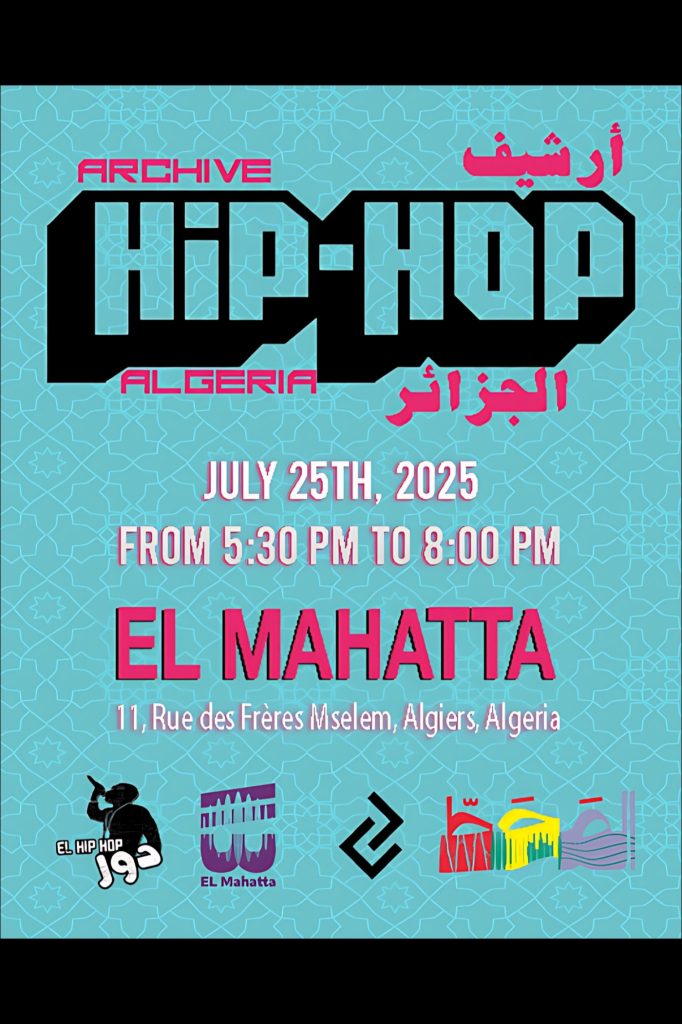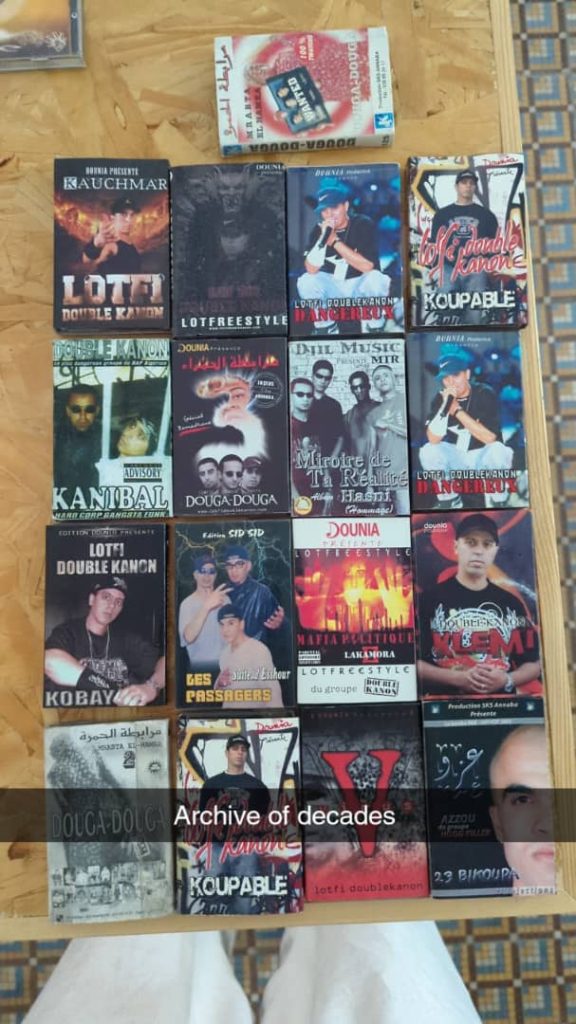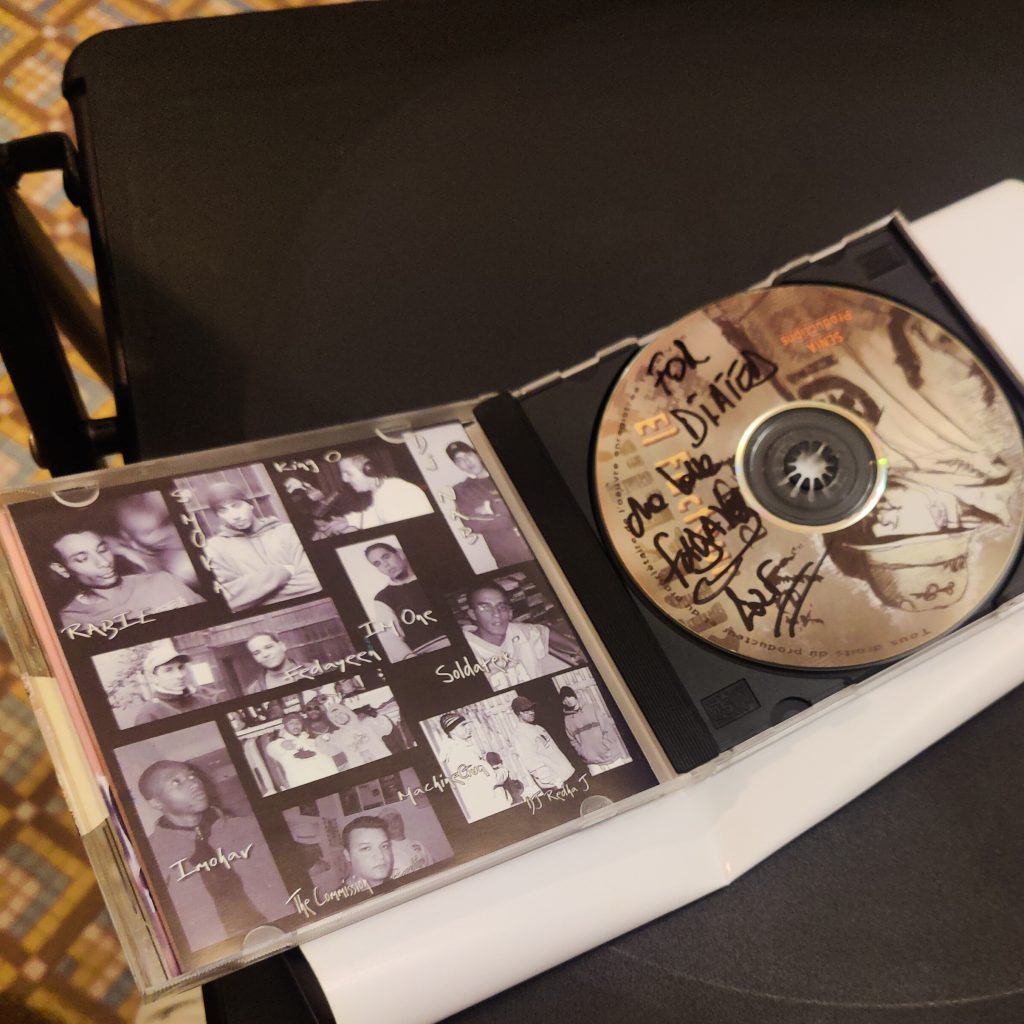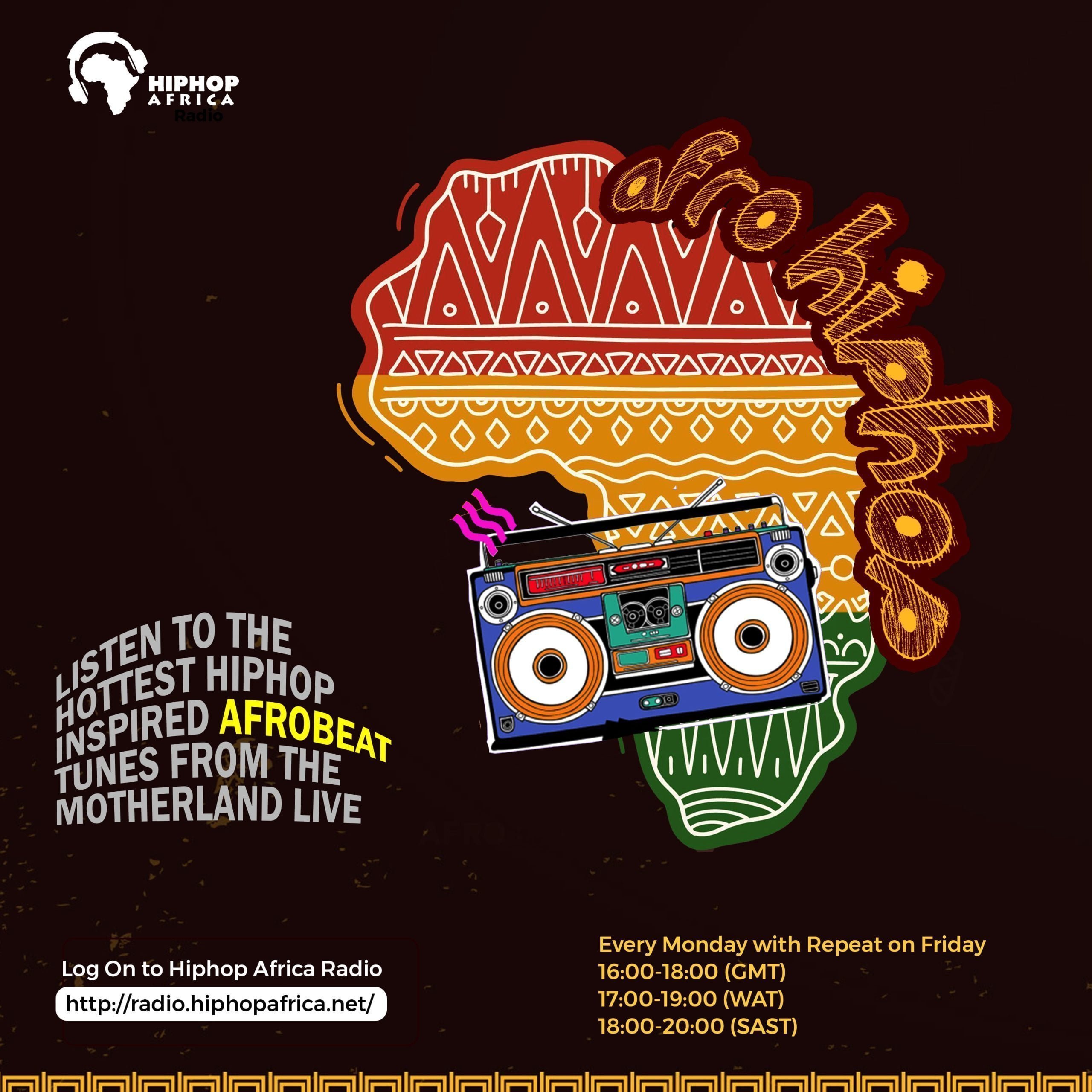Algeria, El Mahatta residency 25th July 2025
Algiers The capital witnessed a unique event : “Rencontre – Digging the Past, Documenting the Future: Archiving Algerian Hip Hop” an unprecedented cultural event dedicated to the Hip Hop memory in Algeria . Organized by Dawer El Hip Hop presented by Monst-R “Sohayb Kehal and Mohamed Amine Benloulou collaborating with the artistic space “El Mahatta” presented by Reda Mhenni Aka “El Moutanakil” this project was able to unite artists, researchers and activists towards a shared goal : exploring effective methods to extract, classify, document and archive the Hip Hop scene in Algeria.

Visual presentations and committed speeches.
The first part of the event started at 17:00 with an opening speech by “Monst-R” (Sohayb Kehal) and “El Moutanakil” (Reda Mhenni), who welcomed the attendees and represented the programme of the activity. The event started directly with screening of selected clips (about 35 minutes) from the documentary “The Eternal Spirit of Hip Hop in Algeria” which covered the history and beginnings of Algerian Rap, followed by screening of another short documentary “Ketba Fel Heetan”(writing on the walls) a 5 minutes documentary puts the graffiti art under the spotlight as a means of artistic, social, political resistance. Both of the projects were directed by “Monst-R” (Sohayb Kehal)
At 18:00, was the beginning of the third screening, which is a documentation video made by “Nabil Djedouani” exclusively for this event .The video discusses his experience with Algerian hip-hop, forms of grassroots archiving, and alternative cultures, specifically through lens of cinema .His contribution established theoretical foundations for thinking about the role of the archive in hip-hop culture.
After the shows and before announcing the break, the highlight of the event took place, where “Monst-R” revealed physical archival materials (a collection of cassettes, CD’s and books some of them rare) represents a sample of the projects that were produced in Algerian rap (some were officially released and others remained exclusive and never saw the light of the day)

Examples of the presented material:
● cassette of the first official album in the history of Arabic rap “Intik” under the title of “Gris” produced in 1995 and has never been officially released.
● cassette of the first official relesed album in Algerian rap by “MBS” under the title of “Ouled El Bahdja” was released in 1997
● Cassette of the album “Guerre Civile” by “Hamma Boys” was released in 1997 ● The complete discography (cassettes and CD’s) of the rapper “Lotfi Double Kanon”, whether with his group or as a solo artist.
● CD of an album by “Soldatesk” which was produced by “3rd Rap Record” shortly before 2004 and wasn’t officially released.
● The book “Arab El Rap” written by “Aridj El badraoui” and “Bassant Mahmoud” was published in 2023.
After that, the break was announced, and a small exhibition of the physical archives (cassettes, CDs, etc…) was opened, where attendees were able to view them, take pictures, and engage in discussions over coffee

The Archive as a Space for Creativity
Following the break, the second part of the event commenced with a more dialogic and academic character, bringing together three speakers with diverse approaches and experiences in archiving.
The opening was with “Fada Vex”, a rapper and Hip Hop activist for over 30 years, who used his podcast “Cha Derna” as a living example of archiving, seeking to answer the question: “Why and how can we archive the Algerian Hip Hop and rap scene?”
It was followed by an intervention from “Ibtissam Boulebrachen”, a researcher and activist in Rai music, who spoke about the intersections between rap and Rai, focusing on the late “Dr. Hadj Miliani”, who was an important bridge between rap and Rai and wrote in both fields. Then came the turn of activist “Zakaria Akhrouf”, who, drawing on his experience in collecting rap archives, shed light on issues related to copyright and the obstacles that must be overcome to lay a solid foundation for the Algerian rap archive.
After that, the floor was opened to the audience to ask questions, before the atmosphere heated up in a lively discussion between “Fada vex” and “DJ SL.” Everyone then moved on to the second break, which served as a prelude to the third part of the event.
Open Discussion and Remarkable Conclusion
The third part lasted for about an hour and took the form of an open discussion among the attendees, aiming to determine the necessary methods and develop a practical roadmap for beginning the documentation of Algerian Hip Hop’s memory. The dialogue included an exchange of experiences between veterans and youth, as well as the sharing of ideas on how to collect scattered archives, protect them from loss, and make them accessible to researchers and the public.
As for the conclusion, it was another remarkable moment, as another part of the archive was unveiled- this time in a different way. Multiple copies of Album “El Facteur” (2004) by Fada Vex were displayed, along with signed copies of the poster for the album “Ramz El Maktoub” (2010) available for sale. This moment turned into a spontaneous conversational space, where attendees exchanged stories and memories tied to these works, took photos, and enjoyed an atmosphere that combined nostalgia with celebration of the scene’s history perfectly embodying one of the event’s goals and giving the audience the chance to acquire an important piece of Algerian rap’s archive.
Foundational Act and Collective Space
This open discussion underscored the strength of the event in bringing together diverse voices and experiences in a single space, with participation from activists and contributors from various backgrounds: rappers, directors, producers, cultural actors, academics, graffiti artists, and slammers. It succeeded in breaking generational barriers by uniting figures from the early days of Algerian rap with contemporary names, such as Fada Vex, DJ SL, Icowesh, Monst-R, Zahham, Ztella and others…
The event “Digging the Past, Documenting the Future: Archiving Algerian Hip Hop” marked a first step toward answering the essential question: “What are the most effective methods to preserve and document the memory and archive of Algerian hip-hop ?” It also opened the door to the possibility of establishing a future platform and a comprehensive project that would bring together both physical and digital archives, serving as a reference for future generations and preserving the memory of a culture that has remained marginalized for decades. This event was followed the next day by another activity in downtown Algiers, at the venue of “Artissimo” titled “Gaâda Hip Hop”, which also resonated strongly especially with the addition of live performances by rappers, breakdancers, and beatboxers…
Article by:
● Monst-R (Soheyb Kehal)
● Zakaria Akhrouf
Translated to English by:
● Adem Akkak


